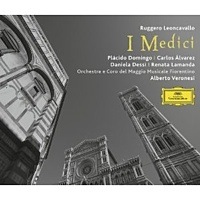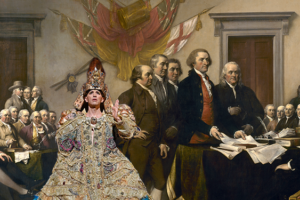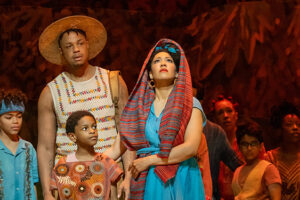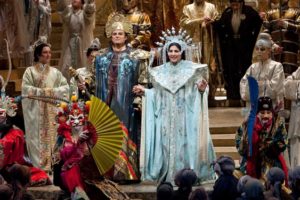
An ambitious and Wagner-smitten Ruggero Leoncavallo wrote his rarely heard opera I Medici (Historical Action in Four Acts) as the beginning of what he planned as “an epic poem in the form of a historical trilogy.” Taking his lead from the Ring, Leoncavallo called his planned trilogy Crepesculum, an homage to the Italian translation of “Götterdämmerung” (i.e,, “il crepuscolo degli dei”). I Medici was to have been followed by works entitled Gerolamo Savanarola and Cesare Borgia; however, after the tremendous success of Pagliacci in 1892 and the first production of I Medici in 1893, Leoncavallo never returned to his trilogy and the final two operas never materialized.
I Medici has two major plot threads. Set in 1478, the political thread concerns the consolidation of power in Florence by Lorenzo and Giuliano de’ Medici, and the assassination attempt upon the brothers by papal conspirators. A parallel thread involves the love triangle of the passionate Giuliano and his idealist love for the frail, consumptive Simonetta as well his decidedly physical love for her companion Fioretta. One of the difficulties with the opera is that these two threads never really connect — I kept having the feeling that I was hearing two different operas grafted together without much success.
Deutsche Grammophon has issued a starry new recording of the complete opera. Conductor Alberto Veronesi leads the Orchestra and Coro del Maggio Musicale Fiorentino in a fiery, authoritative reading of the score. He clearly has affection for the more obscure elements in the verismo repertory, and he certainly has something to say in bringing this difficult piece to life. From the stirring, fanfare-dominated prelude to the lyrical love songs of Simonetta, the conductor breathes as much life as he can into Leoncavallo’s uneven music. Though most of the more political and nationalist music is rather overheated, the love music mainly falls flat — the love duet between Giuliano and Simonetta that ends Act I, for example, never gets off the ground even in its climactic moments. The references to Wagner are heavy-handed in that same duet, with music from Siegfried clearly interposed at one point.
The “star names” in this recording are seriously miscast. Plàcido Domingo brings his usual intelligent phrasing and intense, heroic demeanor to the difficult tenor role of Giuliano, but his forays into the upper register are uniformly strained and pinched, and he is in extremis in vocal climaxes. Still, he manages some beautiful singing in the middle range, though the fire in his voice is fading. Soprano Daniela Dessì turns shrill and wiry on top, and she attacks the consumptive waif Simonetta (a sort of Giselle/Antonia role who both dances AND sings herself to death) as if she thought she was singing Tosca.
Much more successful is mezzo-soprano Renata Lamanda as Fioretta, who becomes pregnant by Giuliano but never seems to pull him away from thoughts of Simonetta. Her voice is powerful from top to bottom, and she shapes phrases with passion and vocal variety. Baritone Carlos Alvarez is a towering Lorenzo de’ Medici, especially excellent in the final act when Lorenzo convinces a doubting populace to place him in power. He sings with great nobility and clarity, and acts the different sides of the character stylishly. Also notable here is Eric Owens as a particularly menacing Montesecco.
This recording is a valuable addition to the verismo discography, especially for the brilliant work of Veronesi and Alvarez. It’s also exciting to hear a well-produced recording of a work that one is unlikely to hear elsewhere. Despite the noted difficulties, this opera contains numerous moments of searing musical intensity, and Leoncavallo finds ways to integrate a number of inventive styles. Those who like their verismo “over the top” (and I must admit to being one) should have a fine time.
























Comments